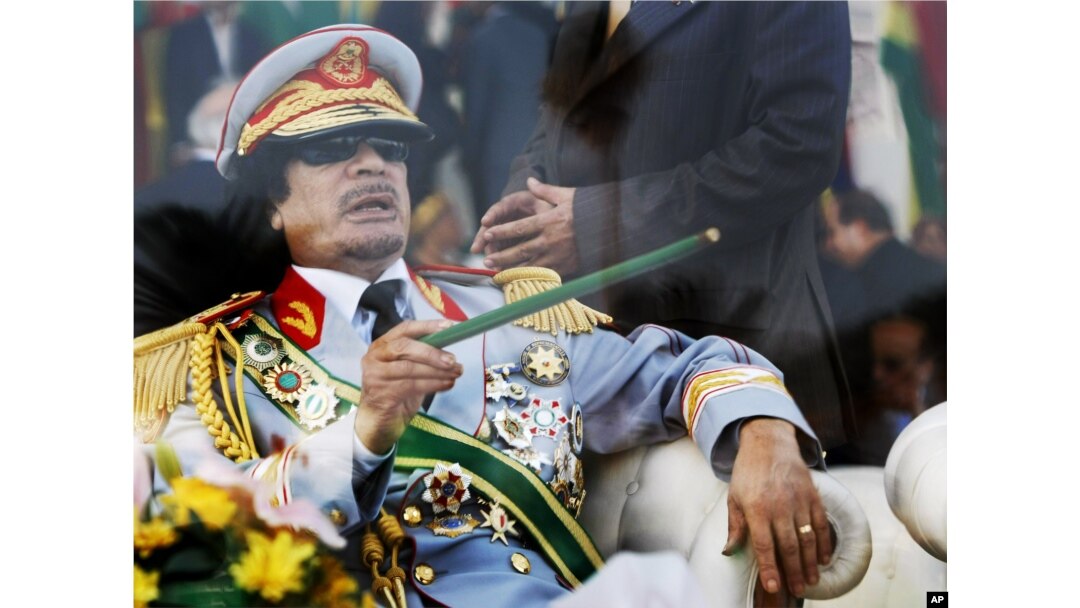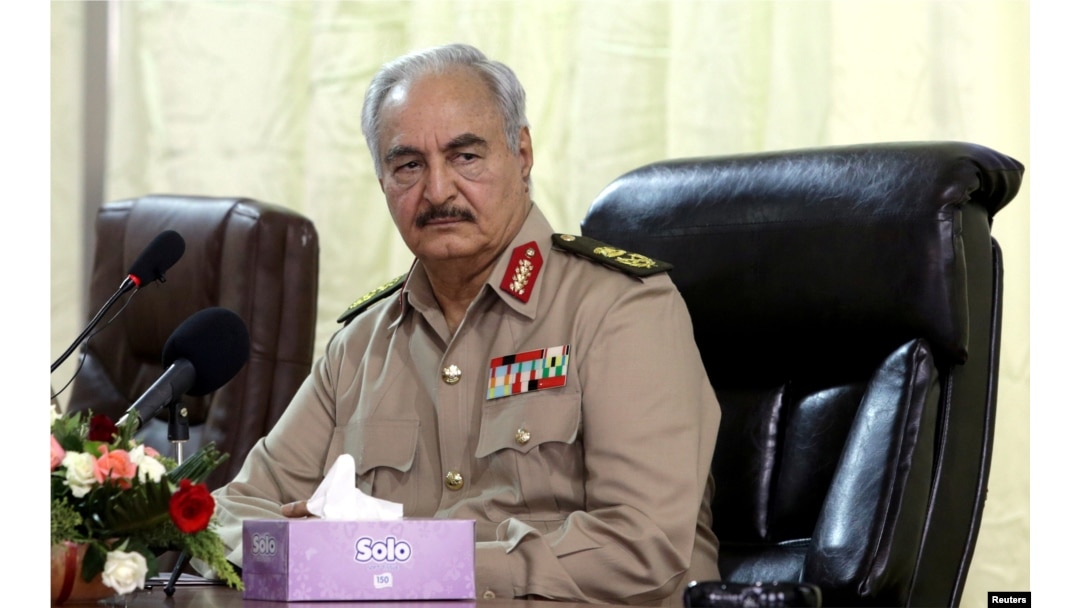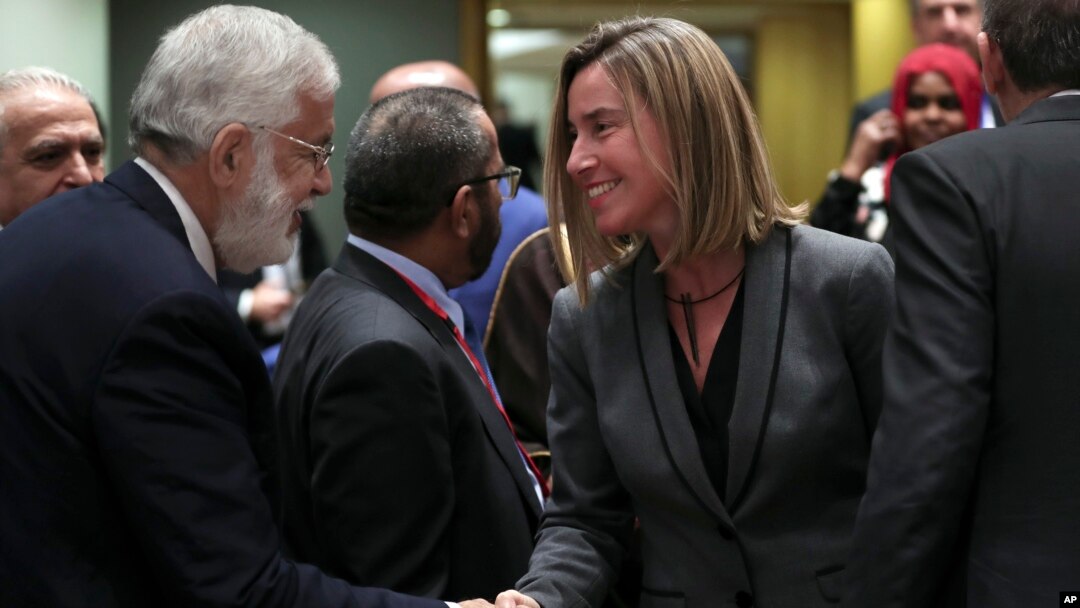On February 17, eight years ago, Libyans rose up and launched a rebellion that led to the ouster of autocrat Col. Moammar Gadhafi. The high expectations of what life would be like without Gadhafi are no nearer being met — hope has given way to despair with the north African country frozen in a multi-sided conflict dividing regions, towns and involving dozens of rival militias.
This year, as it has every anniversary since 2012, Tripoli’s Martyr’s Square will once again be crowded with revelers waving the red, black and green national flag. Revolutionary music will blare from makeshift loudspeakers.
But the anniversary is likely to be more subdued. For many Libyans the commemoration will be a far cry from the joy of the first post-uprising anniversary when Gadhafi’s fall was fresh and people were still relishing a new freedom to say what they liked.

FILE - In this Tuesday, Sept. 1, 2009 file photo, Libyan leader Moammar Gadhafi gestures with a green cane as he takes his seat behind bulletproof glass for a military parade in Green Square, Tripoli, Libya.
Back then Libyans excitedly predicted their country was destined to become a ‘Dubai on the Mediterranean.’ Now Libya appears further away from fulfilling that prophecy.
Since Gadhafi’s ouster and gruesome death on a desert road outside the coastal city of Sirte, Libya has seen a series of prime ministers and U.N. envoys, all of whom have failed to piece together a fractured country and arrive at a political settlement to bring stability and end lawlessness.
Divisions between Western powers — especially between Italy and France — over the best strategy to pursue, as well as a vague U.N. road-map, have not helped, say analysts. Nor has the agitation by other outside powers all armed with regional agendas and backing competing groups.
Chief among them are an internationally recognized Government of National Accord led by Fayez al-Sarraj in Tripoli and a rival administration in Libya’s east loyal to strongman Khalifa Haftar, a former Gadhafi general who broke with the autocrat and lived in exile in the United States for many years. He has the backing of the United Arab Emirates, Egypt, Russia and France.

FILE - Libya's eastern-based commander Khalifa Haftar attends a security conference, in Benghazi, Libya, Oct. 14, 2017.
U.N. officials say Haftar still harbors ambitions to pull off a military solution. But despite progress this week in capturing the city of Derna from al-Qaida-linked militants and his offensive in the fractious south, where his forces took control of Libya’s largest oilfield, Haftar doesn’t have the capacity, they say, to impose his will on the West of the country and the powerful militias of Tripoli and Misrata.
But the splits are more Byzantine than West versus East. In the south there are ethnic and tribal feuds and the country is a jigsaw puzzle of rival militias and warlords. They have little incentive to disband and much invested in the chaos that has enriched them.
A reconciliation conference had been scheduled for last month, but failed to meet — to the frustration of U.N. envoy Ghassan Salamé. The conference was intended to have been a precursor for presidential and parliamentary elections this spring designed to repair the entrenched splits paralyzing the country.
Speaking to the U.N. Security Council in January, Salamé declined to set a date for the conference, but said he hoped it would be staged “in the coming weeks.”
SEE ALSO: Report: E. Libyan Forces Launch Airstrikes Near El Feel Oil FieldHe warned the Council the clock was ticking. “We can fight fires, but eventually there will be an inferno that cannot be extinguished, so we must go beyond and tackle the underlying dysfunctionalities of the Libyan state. The political deadlock has been underpinned by a complex web of narrow interests, a broken legal framework and the pillaging of Libya’s great wealth,” he said.
But the U.N. road-map, drafted in 2017, has been faulted as ill-defined and impractical by some influential analysts, who say it fails to cover many crucial topics such as the issue of decentralization and the sharing of the country’s oil revenue between regions and is confusing about the timing of a referendum on a draft constitution and elections.
Critics also say the United Nations places too much faith on formal domestic political leaders who have no real power, which they say rests more with militias and their warlords.
On Monday, the African Union backed the idea of elections, saying it planned in conjunction with the U.N. to hold an international conference to discuss the Libya crisis in July as a stepping stone for nationwide elections earmarked for October.
SEE ALSO: UN Appeals for $200M to Assist 550,000 Vulnerable People in LibyaSome political analysts are skeptical of continuing with the U.N. plan. Nationwide elections are unworkable, they say, and risk inflaming rivalries and triggering more violence. “The level of insecurity in the country may lead to low turnout,” according to analysts Karim Mezran and Wolfgang Pusztai.
“The low level of security will be exploited by spoilers to undermine the credibility of the new parliament. There will be difficulties also in staging an effective electoral campaign in such a fragmented environment and with a barely-functioning media," they say. "These and other considerations show that the country is not ready for elections in any aspect, neither from a legal nor from an organizational point of view and that premature elections would be very risky and could even accelerate the descent of the country into much more violent confrontations between the various armed actors.”
In a recently published paper by the U.S.-based Brookings Institution, the Mezran and Pusztai argue for a city-based strategy for Libya’s rebuilding and a restoration of order, pointing out that there are islands of stability within the overall mess. “Much of the emphasis should shift to local actors—elected municipal governments, supportive militias that are willing to abide by higher standards of behavior and cease criminal misconduct, and civil society groups,” they say.
Their idea is that while the international community rewards individual, functioning municipalities, national-level efforts should continue as well with a focus on building up the coast guard and elite security forces to guard key national assets and personnel and to promote economic reforms.
They identify the United States as the key to progress, saying its leadership is indispensable and has advantages in becoming the arbiter because of its “distance from Libya, its relative disengagement from the country in recent times, and its relationships with European allies as well as Persian Gulf partners.”
Either way, the drift and disorder in Libya risks contagion, warn analysts. Islamic State adherents have carried out a series of bombings, including one in December on the foreign ministry in Tripoli that left two dead, and in May they stormed and set fire to the headquarters of Libya’s electoral commission, killing at least a dozen people and coming close to murdering visiting Western advisers.
In the south, Libya’s porous and long borders with Chad, Niger and Sudan remain easily crossed by people smugglers and jihadists alike.


